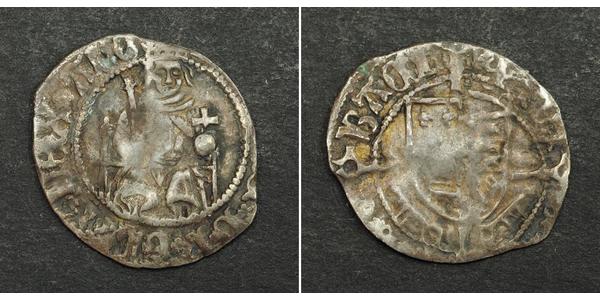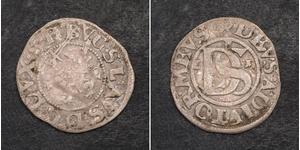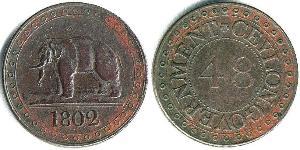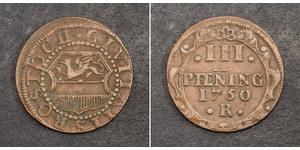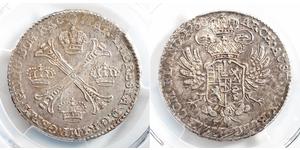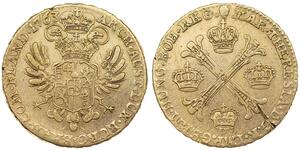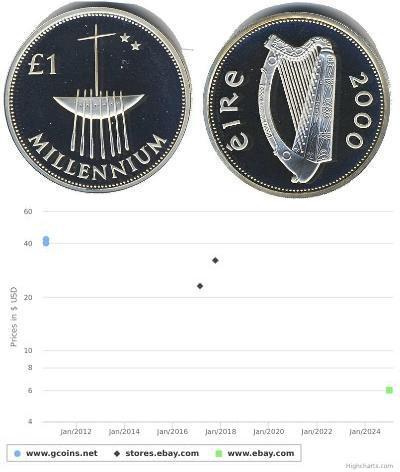(sold for $46.0)
1509, Great Britain, Henry VII. Silver Penny Coin. Sovereign Type. York Mint!
Mint Place: York Mint Period: 1485-1509 References: N. 1728, S. 2236. Condition: Struck lightly off-center, which allowed much of the legends to be well visible, deformed and lightly flattened in the center, otherwise about VF! Diameter: 17mm Weight: 0.78gm Material: Silver
Obverse: King holding orb and sceptre, seated on throne with one trefoil-topped pillar. Legend: HENRIC * DI * GRA * REX * ANG
Reverse: Shield on long cross fourchée. Two keys (mint-mark) in lower fields. Legend: CIVI - TAS - EBO - RACI
Edward was an extremely capable and daring military commander. He crushed the House of Lancaster in a series of spectacular military victories. He was a popular and very able king, despite his occasional (if serious) political setbacks—usually at the hands of his great Machiavellian rival Louis XI of France. He did lack foresight and was at times cursed by bad judgement, but he possessed an uncanny understanding of his most useful subjects, and many who served him remained loyal until his death.
Domestically, Edward's reign saw the restoration of law and order in England; indeed, his royal motto was modus et ordo, or "method and order". The latter days of Henry VI's government had been marked by a general breakdown in law and order, as well as a sizeable increase in both piracy and banditry. Edward was also a shrewd and successful businessman and merchant, heavily investing in several corporations within the City of London. He also made the Duchy of Lancaster property of the crown, which it still is today. During the reign of Henry, there had been corruption in the exchequer. Edward made his household gain more control over finances and even investigated old records to see that payments had been made. Documents of the exchequer show him sending letters threatening officials if they did not pay money. His properties earned large amounts of money for the crown.
Henry VII (Welsh: Harri Tudur; 28 January 1457 – 21 April 1509) was the King of England and Lord of Ireland from his seizure of the crown on 22 August 1485 to his death on 21 April 1509. He was the first monarch of the House of Tudor.
Henry attained the throne when his forces defeated King Richard III at the Battle of Bosworth Field, the culmination of the Wars of the Roses. He was the last king of England to win his throne on the field of battle. He cemented his claim by marrying Elizabeth of York, daughter of Edward IVand niece of Richard III. Henry was successful in restoring the power and stability of the English monarchy after the civil war.
His supportive stance of the British Isles' wool industry and his standoff with the Low Countries had long-lasting benefits to all of the British economy. However, the capriciousness and lack of due process that indebted many would tarnish his legacy and were soon ended upon Henry VII's death, after a commission revealed widespread abuses. According to the contemporary historian Polydore Vergil, simple "greed" underscored the means by which royal control was over-asserted in Henry's final years.
Henry can be credited with a number of administrative, economic and diplomatic initiatives. He paid very close attention to detail, and instead of spending lavishly he concentrated on raising new revenues and after a reign of nearly 24 years, he was peacefully succeeded by his son, Henry VIII. The new taxes were unpopular and two days after his coronation, Henry VIII arrested his father's two most unpopular ministers, Sir Richard Empson and Edmund Dudley. They were charged with high treason and were executed in 1510.
Only 1$ shipping for each additional coin purchesed!

|
Posted by:
anonymous 2019-08-01 |
1/2 Kronenthaler Netherlands Silver
group has 9 coins / 8 prices
⇑

